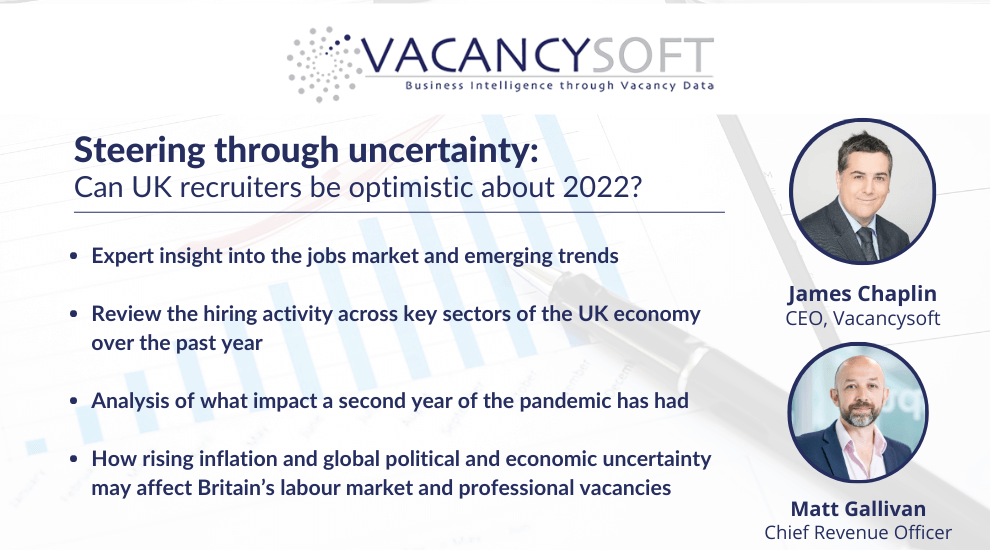
Steering through uncertainty: Can UK recruiters be optimistic about 2022?
As we are started the year 2022 we wanted to take time to look back to 2021, of what has been a frenetic year, with recruiters challenged in unique ways never seen before, the big question was: What next?
This free and exclusive virtual event gathered Britain’s recruitment industry leaders to discuss the following insights:
• Review the hiring activity across key sectors of the UK economy over the past year and present expert insight into the jobs market and emerging trends
• Analyse what impact a second year of the pandemic has had and look ahead to how rising inflation and global political and economic uncertainty may affect Britain’s labour market and professional vacancies.
James Chaplin, Vacancysoft CEO presenting, where attendees also had the opportunity to both network with each other and ask questions about the presentation directly.
Matt Gallivan, Chief Revenue Officer talks about tools that allow you to make data-driven decision making by analysing the market as to what is happening in your markets, whether that be by sector, location or by role. Vacancy Analytics gives you knowledge and data at your fingertips.
Agenda as follows:
12.00 doors open – introduction and short networking
12.05 20-minute presentation on market activity by James Chaplin
12.25 15-min Data-driven decision making in 2022
12.40 Annual Magazine launch
12.45 Q&A
13.00 Event ends
If you are responsible for business planning and strategy don’t miss this unique opportunity to get insights on the latest market activity and what it could mean for your business.
This webinar is useful to: Recruitment Firm Directors, Operational & Marketing Managers in Recruitment Firms, Corporate Recruiters, Managers in RPOs and MSPs. HR Managers.
Download our Year in Review Magazine 2021 edition below!
In our annual magazine 2021 edition you will find a full review of the hiring activities across key sectors of the UK economy over the past year. The magazine covers trends seen in Britain’s tech, life sciences, law, finance, real estate and insurance industries.
Alternatively, download our presentation slides below:

Midlands – UK Regional Labour Market Trends, March 2025
Between 2023 and 2024, professional vacancies in the Midlands fell 9.0%, outpacing the national decline of 1.5%, with the West Midlands seeing the sharpest drop. Economic pressures, including retail closures and a slowdown in investment, have driven this regional contraction.

Internal Audit – UK Finance Labour Market Trends Report, March 2025
The UK internal audit job market is surging in early 2025, driven by regulatory pressure from ECCTA and FCPA updates. January saw a 70% spike in vacancies as firms scale up compliance, with demand expected to keep rising through the year.

Year in Review – UK Regional Labour Market Trends, January 2025
Regional disparities in recruitment highlight increasing economic imbalances across the UK. In 2024, London was the only region to see YoY growth, boosting its share of total vacancies from 34.4% to 36.8%.

Year in Review – UK Life Sciences Labour Market Trends, January 2025
After a subdued 2023, the UK’s life sciences industry saw stabilised recruitment in 2024, with vacancies rising 5.2% year-on-year to 7,521.

Year in Review – UK Legal Labour Market Trends, January 2025
Amid political transition and economic recovery, 2024 proved largely positive for the UK legal sector, with vacancies rising 14.2% across England and Wales. A post-election surge in M&A activity, especially large-cap buyouts, drove demand for legal professionals, aided by falling interest rates.

Year in Review – UK Insurance Labour Market Trends, January 2025
AI adoption into insurance is accelerating as businesses optimise processes to improve outcomes while streamlining headcounts, with claims in particular being impacted. As a result, despite a year where the sector saw record profits, vacancies have fallen by 11.7% in 2024 compared to the year before.

Year in Review – UK Tech Labour Market Trends Report, January 2025
The Government initiative to invest in AI-related infrastructure is at a time when the industry is accelerating away and while the UK remains a global leader, the planned investment will facilitate further growth and hiring.

Year in Review – UK Finance Labour Market Trends Report, January 2025
The combination of increased investment in AI, political shifts in the UK and falling interest rates has made 2024 a pivotal year for the finance sector.

Year-in-Review Magazine: A New Year, A New Government – What’s next for the UK employment market?
A new year brings a new government, in both the UK and the USA, with significant policy shifts in both countries.

London – UK Legal Labour Market Trends, November 2024
The general election’s immediate impact has, unsurprisingly, led to record recruitment, particularly in July. Moreover, Labour’s focus on employment law reforms has driven a surge in demand for employment lawyers, with August also seeing record levels of legal recruitment.


